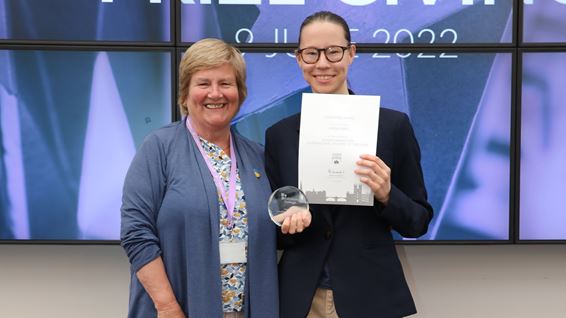The College of the Future: Scotland-Specific Final Report
As the vaccine roll-out hails the potential beginning of the end to the pandemic, a new report from leading experts across education and business – including Edinburgh College Principal Audrey Cumberford – is calling for colleges and skills to be made central to Scotland’s recovery plans and in creating a fair, green future economy.
Our Principal and her colleagues on the Independent Commission on the College of the Future have this week set out their vision for the future of colleges in Scotland.
Currently, the post-16 education and skills system in Scotland is leading the way in driving a collaborative, connected and agile tertiary (post-16) system. The report published this week calls for this bold reform agenda to move further, faster, to meet the rapidly changing and complex skills needs of the future.
The new report, The Scottish College of the Future, sets out recommendations, that if implemented by the Scottish Government, funding bodies and colleges, will empower the sector to deliver more strategically on skills and innovation support for new jobs, good jobs and green jobs. It would also transform the life chances for learners of all ages and levels.
Central recommendations to create the Commission’s vision for the Scottish college of the future include:
- Ensuring that Scotland’s post-16 education and skills system is genuinely there for everyone, whatever their age, ability or circumstance. Ideas include (1) ensuring that institutions across the system are funded fairly, and (2) empowering anyone to learn by offering access to the grants and loans they need whatever route they take, with flexibility to have support across FE and HE.
- Increase the impact of the post-16 education and skills system by driving further integration. Proposals include (1) aligning and integrating the roles and responsibilities of the Scottish Funding Council (SFC) and Skills Development Scotland (SDS) relating to skills alignment to better achieve delivery of skills services, (2) defining the respective roles, remit and provision of colleges and universities to lessen competition at the higher technical level.
- Unlock the potential of colleges to drive innovation by deepening links with employers. Suggestions include (1) establishing the unique role of colleges in business support and innovation as a core part of their remit, (2) creating a national network of specialist “hubs” to address critical skills shortages, especially in relation to higher level technical skills (for example in STEM and digital), and (3) creating a single FE and HE Scottish Government innovation fund.
As the Principal of Scotland’s capital college, I have witnessed first-hand the innovation, creativity and adaptability of our staff and our students in responding to the impacts of COVID-19. Education and skills development have never been more important as people of all ages and businesses across the country face the loss of livelihoods. Our report sets out what we believe is the untapped potential of colleges and what needs to happen to ‘unlock’ that potential. We must ensure our colleges play a significant and essential role in the delivery of lifetime learning opportunities and exist in a symbiotic relationship with business, in particular supporting economic growth and priority sectors for Scotland.Audrey Cumberford FRSE MBE, Edinburgh College Principal and CEO
We need a much deeper partnership between employers and colleges, together with universities, schools and other training providers, to achieve a much more joined up offer from the education and skills system. This will empower strategic engagement with employers to co-develop and design programmes across innovation and skills. That is why we’re calling for Government to invest in the development of specialist college ‘Employer Hubs’. These would work with universities, councils and others, as a one-stop shop for employers, offering an opportunity to get support on skills needs and strategic advice in areas such as new business models and workplace innovation, as well as to try out new technologies. This is vital as we recover from the pandemic and transition to a green economy.Nora Senior CBE, Executive Chair, UK Regions & Ireland, Weber Shandwick
Colleges have a vital role to play in helping local economies and communities to respond to the economic and employment dislocation created by COVID-19, and to adapt to other sources of change, such as the transition to a low carbon economy. We need colleges to be able to drive a fundamental change in the volume of adult and lifelong learning that is taking place, so that adults can reskill and upskill and also gain skills and knowledge to help them in their roles as parents, citizens and members of local communities.Professor Ewart Keep, Emeritus Professor in the Department of Education, University of Oxford




